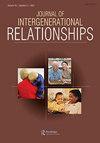“OK婴儿潮一代”:煽动性话语与代际沟通
IF 1
Q3 GERONTOLOGY
引用次数: 1
摘要
摘要“婴儿潮一代”是Z世代成员用来驳斥老年人意见的一个流行短语。考虑到这个短语的使用量和反应的多样性,了解“好吧,婴儿潮一代”是如何在印刷媒体上被描述的很重要。为此,收集了2019年10月至2020年2月期间印刷的《纽约时报》、《华尔街日报》和《华盛顿邮报》的新闻文章。在整理数据后,完成了一项主题分析,结果表明“OK婴儿潮一代”被描述为一种煽动性话语,强化了基于年龄的刻板印象。这种描述依赖于(1)基于一维刻板印象的短语定义过于简单化(2)代际鸿沟的强化,以及(3)在代际互动中接受年龄歧视的交流行为。基于这些发现,提供了一系列理论和应用启示,使该短语的使用成为问题,并鼓励富有成效的代际互动。本文章由计算机程序翻译,如有差异,请以英文原文为准。
“OK Boomer”: Demagogic Discourse and Intergenerational Communication
ABSTRACT “OK boomer,” is a viral phrase used by members of Generation Z to dismiss the opinions of older adults. Given the rise in usage of and the varied reactions to the phrase, it is important to understand how, “OK boomer,” was portrayed in print media. To do so, news articles from the New York Times (NYT), Wall Street Journal (WSJ), and Washington Post (WaPo) that were printed during October 2019-February 2020 were collected. After organizing the data, a thematic analysis was completed, which showed that “OK boomer” was depicted as a form of demagogic discourse that reinforced age-based stereotypes. This portrayal relied on (1) an oversimplified definition of the phrase that was grounded in unidimensional stereotypes (2) the reinforcement of generational divides, and (3) the acceptance of ageist communicative behaviors in intergenerational interactions. Based on these findings, a series of theoretical and applied implications that problematize the use of the phrase and encourage productive intergenerational interactions are provided.
求助全文
通过发布文献求助,成功后即可免费获取论文全文。
去求助
来源期刊

Journal of Intergenerational Relationships
GERONTOLOGY-
CiteScore
2.80
自引率
14.30%
发文量
31
期刊介绍:
The Journal of Intergenerational Relationships is the forum for scholars, practitioners, policy makers, educators, and advocates to stay abreast of the latest intergenerational research, practice methods and policy initiatives. This is the only journal focusing on the intergenerational field integrating practical, theoretical, empirical, familial, and policy perspectives.
 求助内容:
求助内容: 应助结果提醒方式:
应助结果提醒方式:


